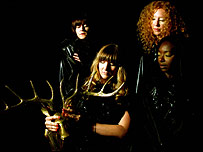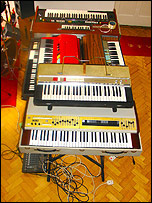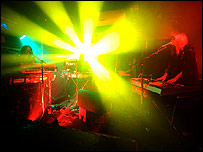| Twisted sisters | |
 |
BBC Manchester |
Manchester has long had a rich seam of eccentricity in its music scene, but even by such standards, an 'all girl Transistor Organ Quartet' is a band from the leftfield – but that is exactly how The Sisters of Transistors describe themselves.  In fact, Sister Naomi Doric Pencrest, one of the four Sisters, goes much further with her own description – she says that while some people say their music is "a cross between horror film soundtracks and disco, we would say it’s a contemporary take on 1930s occult parlour music." So where did the idea for the Sisters come from? It turns out that that is a tale which wanders between truth, history and myth, and involves panic in America, army issue organs, a Derbyshire pub and a member of 808 State! "There’s a tradition of organ quartets dating back to the 30s, when the Hammond organ became ‘THE’ instrument amongst the industrialists and debutants of New York. "A concert by the Lillian Meyers Quartet at the World Fair in 1939 ended in panic, as the pavilion collapsed due to a wave formed by the four organists. This lead to a ban on organ quartets throughout the US, which remained until Steve Reich premiered his 'Four Organs' to a virtual riot at Carnegie Hall in 1968.  "Another organ quartet, a set of Manchester-based musicians known as the Burton Wood Quartet, managed to keep some of the earlier pieces from The Lillian Meyers Quartet alive during World War Two, as the Burton Wood Airforce Base became the distribution point for a special military model of Hammond organ - The Model D - supplied to US bases and chapels. "The first Burton Wood Quartet were quite well known during the war years, as alongside their classical repertoire, they played at dances, though they never travelled from the base due to the untransportable weight of the Hammonds.  "Graham Massey, who plays drums for us, first found out about the Burton Wood Quartet whilst playing at a rave in the old US base. After contacting BWQ member Steve Garnier, who lives in Columbus in America, through the Combo Organ Forum, he discovered the band’s repertoire was kept alive during the 50s by an all-ladies quartet at a Warrington music shop on Sunday afternoons. "A second quartet started up at the Stockport branch, from which sprang the La La La’s, an organ quartet using the new transistor organs in the early 60s. Again, due to a reluctance to travel, they rarely played anywhere but The Cat and Fiddle, a well known bikers’ haunt in the Derbyshire hills. "And that’s where we now come in. With the advent of the Internet forums and auction websites, it has now been possible to present this historical music along with its controversial effects." Is the story all fantasy or are there little-known facts gleaming out of it? It’s probably best just to take it as an exploration of where the idea for the quartet comes from – though it doesn’t answer the question of how they got together. According to Sister Naomi, the 'Combonauts' came into being as a result of "a rigorous selection process over the Internet and then at auditions in Manchester. "The application process required hereditary conditions, positions in music education facilities and a good working knowledge of the 1960s transistor combo organs, including maintenance and repair. "Two of us had met at Salford University, three of us had been to the Augablina Summer School in Iceland, and all of us connected through the Combo Organ Forum before making the move to Manchester in 2003 to await the selection process. "Graham was Patron of the South Manchester Museum of Keyboard Technology and did a lot of the research on organ quartets. It was a condition of us rehearsing at the Museum that he could play drums." The South Manchester Museum of Keyboard Technology? Apparently, that’s another piece of the Sisters’ mystery, a little-known menagerie of all things organ that is both inviting and heavily guarded. "SMMOKT is our headquarters at a secret location in the Mersey Valley. Anyone can visit but would have to travel there blindfolded in our wagon then tossed out in Chorlton Water Park naked.  "It’s staffed by disgraced UMIST lab technicians Dave Seaton and Chris Olerenshaw, who maintain a huge collection of vintage keyboards, organs, electric pianos and synthesisers. "Some of the museum’s prize exhibits include a 30s Clavioline, a Russian combo organ from the 60s, a Pike Custom Modular Synthesiser from Brighton University and some rare Wurlitzer training pianos from Salford University." Thankfully, there’ll soon be a chance to see some of that considerable collection without any danger, as the Sisters are preparing to play live – though as with everything else, there’s a certain amount of mysticism about even that, as they’re hitting the stage on this year’s extra day, February 29. "It’s actually a significant date in the Egyptian calendar as well as being a leap year, making it an auspicious occasion to play the Pharohs Suite by Lillian Meyers. "When we realised that, we hurriedly looked for a venue for that date a few weeks back, and The Kings Arms were brave enough to accommodate us." And if nothing else, at least seeing them in Salford should mean that you won’t end up starkers in a water park. The Sisters of Transistors play the Kings Arms on Friday 29 February. Entry is £6 |
|